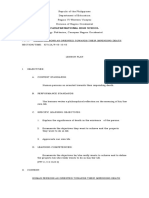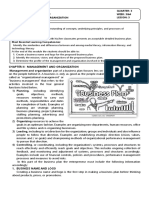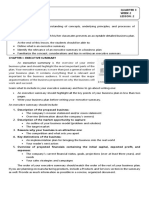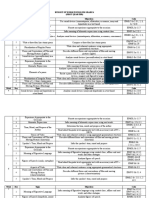Lesson 1 (Week 1)
Lesson 1 (Week 1)
Uploaded by
BrenNan ChannelCopyright:
Available Formats
Lesson 1 (Week 1)
Lesson 1 (Week 1)
Uploaded by
BrenNan ChannelOriginal Title
Copyright
Available Formats
Share this document
Did you find this document useful?
Is this content inappropriate?
Copyright:
Available Formats
Lesson 1 (Week 1)
Lesson 1 (Week 1)
Uploaded by
BrenNan ChannelCopyright:
Available Formats
GRADE LEVEL: SHS 12 WEEK: 1
SUBJECT: Introduction to the Philosophy of the Human Person LESSON: 1
TOPIC: DOING PHILOSOPHY
--------------------------------------------------------------------------------------------------------------------------------------------------
OBJECTIVES:
1. Distinguish a holistic perspective from a partial point of view
2. Recognize human activities that emanated from deliberate reflection
3. Realize the value of doing philosophy in obtaining a broad perspective on life
LESSON PROPER:
LESSON 1: WHAT IS PHILOSOPHY? Aeschylus
Plato’s Theory of Forms c. 525-456 BCE
“Higher world of reality exists” which he believed Before Aeschylus, the Greeks had only one
that is independent and separate from the world of character and a chorus. Thus, the possibilities
things of our daily experience and also called the for conflict and dramatic action were limited,
“World of Idea or Forms” and dialogues between characters were not
Word of Idea or Forms possible.
Is unchanging, universal, eternal and absolute Introduce 2 actors on stage
Perfect Truth, Perfect Justice, Perfect Goodness and The great sin that depicts through his plays is
Perfect Beauty. the sin of “Hubris” (pride or arrogance).
What is a Just State? Aeschylus’ dramas show that pride ruins oneself
Plato emphasized reason: and others.
“Rational inquiry of human society” Sophocles
Believed that an entire community could be c. 496-406 born in Colonus,
transformed through conformity to rational principles near Athens
Plato’s political theory: “A just state had the goal and A Greek poet and dramatist
aim of improving the moral state of the citizens.” He wrote all 123 plays which 7
Plato’s divided people into three groups: plays survive today
1. Those who demonstrate the philosophical He introduced a third actor
characteristics of wisdom and justice should be rulers and also increased the chorus from 12 to 15
2. Those who reveal exceptional courage should be members
soldiers. The plots in his drama are characterized by human
3. Those who are dominated by desire (the masses) motivations and choices.
should be producers and manufacturers He portrayed the divine will overpowering the
Aristotle actions of human. But his works also show humans
c. 384-322 BCE born in are wonderful and how they are motivated by their
Stagira, Macedon commitment to the purpose and meaning of life.
Tutor of Alexander the Oedipus Complex
Great The complex of emotions aroused in a young child,
Desired to understand the typically around the age of four, by an unconscious
physical universe sexual desire for the parent of the opposite sex and
Believed in the importance wish to exclude the parent of the same sex.
of reason in shaping one’s philosophy Oedipus Complex – Boys
Contributions: Electra Complex – Girls
1. Criticism of Plato’s Ideas Greek History
2. Aristotle’s View on Ethics Greeks writing of history removed mythical
3. Aristotle’s View on Politics elements and concentrated on human beings and
Aristotle’s View on Ethics their actions. They wrote about the deeds of
Aristotle believe that in order for us to be fully people and looked for the causes behind the
human, we need to live our lives based on ethics human actions and the events.
Morally virtuous life is to live a life based on Herodotus
reason C. 484-424 BCE
The emotions are part of the human personality. Wrote a history of the Persian
Aristotle’s View of Politics Wars (between the Persians and
For Aristotle, both politics and ethics deal with the Greeks in 5th Century)
the good life. To live a good life, one must be a Herodotus work theme of
virtuous member of a political community. punishment for the sin of “hubris”-lack of humility.
Politics comes from the word “polis” means “city” Thucydides
The three great Athenian tragedians from Greece C. 460-400 BCE
Aeschylus, Sophocles and Euripides. Emphasized the motives and actions of political
leaders and their governments
Believed that by studying the past, one can
learn about human behavior.
LESSON CONCLUSIONS
Ancient Greece reveals that we can learn about the human person from philosophy, poetry, drama, history,
etc. The questions that philosophers, poets, dramatist and historians ask, the problems that they raise, the
issues that they define, the answers and solutions that they try to come up with – all have relevance to the
meaning and process of philosophy, especially the philosophy of human person.
ACTIVITY # 1
Complete the table below. Copy and answer the table below in your 1 whole sheet of pad paper.
ACTIONS WHAT MUST BE DONE BEFORE THE ACTION?
Deciding where to study for Senior High School
Choosing friends
Going to school
Buying a new gadget
Posting your opinion or feelings in the social media
Confronting a person who verbally hurt you
Watching movies that are not allowed for your age
ACTIVITY 2:
INSTRUCTION: Answer the following questions. Write your answer in a 1 whole sheet of pad paper.
1. Based on your answers in Activity 2, what must before making actions?
___________________________________________________________________________________________
2. Is it helpful that you do this before making actions? Why or why not?
___________________________________________________________________________________________
3. As a grade 12 student, what have you realized about this activity? Reflect and explain your answer in your 1
whole sheet piece of pad paper. _________________________________________________________________
ASSIGNMENT: (Personal Reaction). Write your answer in ½ crosswise of pad paper
1. Reflect on the Socratic dictum “The unexamined life is not worth living”.
2. React on the statement that one can be “hooked on philosophy”.
ASSESSMENT: What can you say about the quotation below? Do you agree with this? Express your answers on the space
provided.
________________________________________________________________________________________
________________________________________________________________________________________
________________________________________________________________________________________
________________________________________________________________________________________
REFERENCES:
Introduction to the Philosophy of the human person book. (Sunil H. Stephens)
Internet (PDF Files)
Materials: Notebook, Ball pen, Pencil, Paper
You might also like
- UCSPOL 12 Lesson 1 Introduction To Culture Society and Politics 1Document32 pagesUCSPOL 12 Lesson 1 Introduction To Culture Society and Politics 1Todo RokiNo ratings yet
- Grade Level: 12 Subject: Physical Education and Health Topic: Recreational Activity Quarter: 3 WEEK: 1&2 Lesson: 1 Content Standards: Performance StandardsDocument17 pagesGrade Level: 12 Subject: Physical Education and Health Topic: Recreational Activity Quarter: 3 WEEK: 1&2 Lesson: 1 Content Standards: Performance StandardsBrenNan ChannelNo ratings yet
- Grade Level: 12 Quarter: 3 Subject: Entrepreneurship Week: 1 Topic: Introduction of Entrepreneurship Lesson: 1Document4 pagesGrade Level: 12 Quarter: 3 Subject: Entrepreneurship Week: 1 Topic: Introduction of Entrepreneurship Lesson: 1BrenNan ChannelNo ratings yet
- Personal Development (2ndsem)Document43 pagesPersonal Development (2ndsem)BrenNan ChannelNo ratings yet
- Mock Interview RubricDocument2 pagesMock Interview RubricBrenNan ChannelNo ratings yet
- 40+ Ideas To Spice Up Your RetrospectiveDocument64 pages40+ Ideas To Spice Up Your RetrospectiveSara Hesham100% (1)
- Lesson 3 Looking Back at Human Biocultural and Social EvolutionDocument23 pagesLesson 3 Looking Back at Human Biocultural and Social EvolutionJose Renato NatañoNo ratings yet
- Philosophy SHS - What IsDocument21 pagesPhilosophy SHS - What Isanon_254928515No ratings yet
- Lesson 4 PhilosophyDocument30 pagesLesson 4 PhilosophyRonald Hernando NacionNo ratings yet
- 4th Powerpoint Human OriginsDocument29 pages4th Powerpoint Human OriginsJohn Lorenze ValenzuelaNo ratings yet
- UNIT 1: Studying Culture, Society, and PoliticsDocument26 pagesUNIT 1: Studying Culture, Society, and Politicsrain estrelNo ratings yet
- Midterm PhilosophyDocument7 pagesMidterm PhilosophyMaverick Daryl Waminal NapolereyesNo ratings yet
- Anthropological and Sociological Perspectives On Culture and SocietyDocument14 pagesAnthropological and Sociological Perspectives On Culture and SocietyJhon Leahmarch BaliguatNo ratings yet
- Philosophy Reviewer NATDocument4 pagesPhilosophy Reviewer NATAlexa Ianne Monique TuquibNo ratings yet
- Smarts Seven Dimensions of ReligionDocument13 pagesSmarts Seven Dimensions of Religionapi-314003507No ratings yet
- 2 Qualitative Research Week 2Document22 pages2 Qualitative Research Week 2KIYAH phNo ratings yet
- TG - UCSP (Lesson 1) Starting Points For The Understanding of Culture, Society and PoliticsDocument6 pagesTG - UCSP (Lesson 1) Starting Points For The Understanding of Culture, Society and Politicsjean ApostolNo ratings yet
- Anthropological and Sociological Perspective On Culture and SocietyDocument5 pagesAnthropological and Sociological Perspective On Culture and Societyecardnyl25100% (2)
- Judaism 1Document36 pagesJudaism 1Jaine LuzNo ratings yet
- Ucsp M1Document9 pagesUcsp M1Charmine Dela Cruz - RamosNo ratings yet
- Daily Lesson Plan in Understanding Culture Society and PoliticsDocument3 pagesDaily Lesson Plan in Understanding Culture Society and PoliticsRed AgbonNo ratings yet
- Curriculum Map DISSDocument5 pagesCurriculum Map DISSleila lastima100% (1)
- DLL Philo Week 2Document4 pagesDLL Philo Week 2Ricky Canico Arot100% (1)
- DLL For Philippine Politics and GovernanceDocument20 pagesDLL For Philippine Politics and GovernanceMa. Gina OdalNo ratings yet
- Cot Rating Sheet For MT 2022 2023Document6 pagesCot Rating Sheet For MT 2022 2023Arcee CagampanNo ratings yet
- TOS UCSP 3rd QuarterDocument2 pagesTOS UCSP 3rd QuarterBev Garcia100% (1)
- Powerpoint HangarooDocument17 pagesPowerpoint HangarooJohnmoiNo ratings yet
- 1st Summative USCPDocument2 pages1st Summative USCPNezel100% (2)
- Explains The Development of One's Self & Others As A Product of Socialization & EnculturationDocument25 pagesExplains The Development of One's Self & Others As A Product of Socialization & Enculturationdarlene jane maynesNo ratings yet
- UCSP.Q1Module 2.concept Aspects and Changes in CultureDocument51 pagesUCSP.Q1Module 2.concept Aspects and Changes in CultureHarlyn DatoonNo ratings yet
- Approved Perdev Module 1Document14 pagesApproved Perdev Module 1Cimyrelle TremorNo ratings yet
- Quarter 2-Performance Task 1Document1 pageQuarter 2-Performance Task 1Clarence Ramos100% (1)
- Cheenee V. Nava DLPDocument5 pagesCheenee V. Nava DLPAnn Maureen ConcepcionNo ratings yet
- Diss Study Guide 2nd WeekDocument5 pagesDiss Study Guide 2nd WeekRuth MadriagaNo ratings yet
- Concept Map Quiz - Human MosaicDocument2 pagesConcept Map Quiz - Human MosaicCedric HidariNo ratings yet
- MODULE 2: Human Evolution and CultureDocument9 pagesMODULE 2: Human Evolution and CultureJessaLyza CordovaNo ratings yet
- Introduction To The Philosophy of The Human Person 12 Module 1Document4 pagesIntroduction To The Philosophy of The Human Person 12 Module 1Angelica Madi100% (1)
- Module 1 UcspDocument5 pagesModule 1 Ucspkimberson alacyangNo ratings yet
- Q1 Philosophy Worksheet1Document10 pagesQ1 Philosophy Worksheet1Cheena Francesca LucianoNo ratings yet
- Lesson 2 The Concept, Aspects, and Changes in Culture, Society, and PoliticsDocument11 pagesLesson 2 The Concept, Aspects, and Changes in Culture, Society, and PoliticsYunus Abdula DesuyoNo ratings yet
- Intro To Philosophy Prelim ExamDocument5 pagesIntro To Philosophy Prelim ExamKim FonolleraNo ratings yet
- Midterm PT - Ucsp1Document3 pagesMidterm PT - Ucsp1kimberson alacyangNo ratings yet
- Lesson Plan For ShsDocument3 pagesLesson Plan For ShsGrazel Anne TibaydeNo ratings yet
- Politics and Governance Key ConceptsDocument30 pagesPolitics and Governance Key ConceptsNic AnacanNo ratings yet
- DLLDocument24 pagesDLLrowena andresNo ratings yet
- Practical Research 1 Summative TestDocument2 pagesPractical Research 1 Summative TestFrincez DotimasNo ratings yet
- Grades 1 To 12 Daily Lesson Log School Grade Level Teacher Learning Area Teaching Dates and Time QuarterDocument5 pagesGrades 1 To 12 Daily Lesson Log School Grade Level Teacher Learning Area Teaching Dates and Time QuarterRene John Bulalaque EscalNo ratings yet
- UCSPDocument25 pagesUCSPRhizz A. Torralba-BaccayNo ratings yet
- DLL in Diss Week 2Document4 pagesDLL in Diss Week 2Marlene Mabolo100% (1)
- UCSP DLL 1st WKDocument3 pagesUCSP DLL 1st WKRheena-Ann Dupale PadillaNo ratings yet
- DLL June 25Document1 pageDLL June 25lenieNo ratings yet
- Ucsp Module1Document6 pagesUcsp Module1Yuma YumaNo ratings yet
- Second Quarter ExamDocument4 pagesSecond Quarter ExamElmer LumagueNo ratings yet
- DLL - G12 UcspDocument31 pagesDLL - G12 UcspClaire CleofasNo ratings yet
- Ucsp 2Document3 pagesUcsp 2Joice Dela CruzNo ratings yet
- Understanding Culture, Society, and Politics 2Document92 pagesUnderstanding Culture, Society, and Politics 2Abigail de GuzmanNo ratings yet
- Philippine Politics and GovernanceDocument18 pagesPhilippine Politics and GovernanceJerry De Leon LptNo ratings yet
- WEEK 9 Introduction To Philosophy of The Human Person in Their EnvironmentDocument21 pagesWEEK 9 Introduction To Philosophy of The Human Person in Their EnvironmentPrecious NicoleNo ratings yet
- IWRBS Q1 Mod2 The Dynamics of Geography Culture and ReligionDocument24 pagesIWRBS Q1 Mod2 The Dynamics of Geography Culture and ReligionJustin Nodalo IslaNo ratings yet
- DLL PhiloW1Document5 pagesDLL PhiloW1Jeremy T. Gilbaliga100% (1)
- LP TaoismDocument3 pagesLP TaoismClarissa ReyesNo ratings yet
- UNIT I - UCSP - Concepts of Anthropology, Sociology, and Political ScienceDocument21 pagesUNIT I - UCSP - Concepts of Anthropology, Sociology, and Political ScienceJoseph Tolentino ManookNo ratings yet
- Ucsp PPT Module 2.Document11 pagesUcsp PPT Module 2.AnalizaViloriaNo ratings yet
- Week 1 PhiloDocument89 pagesWeek 1 Philoallenalt465No ratings yet
- Essay of The Greek PhilosophersDocument8 pagesEssay of The Greek PhilosophersScribdTranslationsNo ratings yet
- How To Form A Cooperative JepDocument71 pagesHow To Form A Cooperative JepBrenNan ChannelNo ratings yet
- 1 Understanding Work ImmersionDocument10 pages1 Understanding Work ImmersionBrenNan ChannelNo ratings yet
- Lyceum of The Philippines-Cavite: Gsihm002 - Total Quality ManagementDocument5 pagesLyceum of The Philippines-Cavite: Gsihm002 - Total Quality ManagementBrenNan ChannelNo ratings yet
- Session Topic3 - Chap 1 Introduction - 1sttri2020-21Document21 pagesSession Topic3 - Chap 1 Introduction - 1sttri2020-21BrenNan ChannelNo ratings yet
- Chapter Ii: Management and OrganizationDocument6 pagesChapter Ii: Management and OrganizationBrenNan ChannelNo ratings yet
- COHREP Youth Con Parallel Activity TemplateDocument3 pagesCOHREP Youth Con Parallel Activity TemplateBrenNan ChannelNo ratings yet
- Lesson 4: Methods of Philosophizin GDocument18 pagesLesson 4: Methods of Philosophizin GBrenNan ChannelNo ratings yet
- Session Topic1 - Intro To Research Methods and Statistcs - 1sttri - AY2021-2022Document13 pagesSession Topic1 - Intro To Research Methods and Statistcs - 1sttri - AY2021-2022BrenNan ChannelNo ratings yet
- Republic Act CooperativeDocument72 pagesRepublic Act CooperativeBrenNan ChannelNo ratings yet
- Entrep Q3 Week 2Document4 pagesEntrep Q3 Week 2BrenNan ChannelNo ratings yet
- Philo Lesson1Document19 pagesPhilo Lesson1BrenNan ChannelNo ratings yet
- The Human Person As An Embodied Spiritual Being: LessonDocument17 pagesThe Human Person As An Embodied Spiritual Being: LessonBrenNan ChannelNo ratings yet
- Lesson 2: What Is Philosophy ?Document25 pagesLesson 2: What Is Philosophy ?BrenNan ChannelNo ratings yet
- IN Work Immersion: Grade 12 Senior High School Immersion ManualDocument10 pagesIN Work Immersion: Grade 12 Senior High School Immersion ManualBrenNan ChannelNo ratings yet
- Bread Making: Ddiscussion For The Performance Task in Bread and Pastry Production NC-IIDocument43 pagesBread Making: Ddiscussion For The Performance Task in Bread and Pastry Production NC-IIBrenNan ChannelNo ratings yet
- PT Bread MakingDocument8 pagesPT Bread MakingBrenNan ChannelNo ratings yet
- 1 Understanding Work ImmersionDocument46 pages1 Understanding Work ImmersionBrenNan Channel100% (1)
- Mock Job Interview: Interpersonal SkillsDocument2 pagesMock Job Interview: Interpersonal SkillsBrenNan Channel100% (1)
- 2 Appreciating The Importance of CredentialsDocument15 pages2 Appreciating The Importance of CredentialsBrenNan ChannelNo ratings yet
- Learning Outcome 4: Maintaining Occupational Safety and Health AwarenessDocument4 pagesLearning Outcome 4: Maintaining Occupational Safety and Health AwarenessBrenNan ChannelNo ratings yet
- #1 PorsemDocument37 pages#1 PorsemBrenNan ChannelNo ratings yet
- Lesson 4: Practice Occupational Safety and Health ProceduresDocument6 pagesLesson 4: Practice Occupational Safety and Health ProceduresBrenNan Channel100% (2)
- CET Writing Part 1 (大兵)Document15 pagesCET Writing Part 1 (大兵)Noel JenningsNo ratings yet
- English Main 9Document11 pagesEnglish Main 9Bhuvansh GoyalNo ratings yet
- Leaders and FollowersDocument29 pagesLeaders and FollowersChristopherArjayCigaralNo ratings yet
- 7 Habits of Highly Successful People SummaryDocument3 pages7 Habits of Highly Successful People SummaryRhey MaalamNo ratings yet
- SIM SDL EDUC 101 3rd Exam CoverageDocument79 pagesSIM SDL EDUC 101 3rd Exam CoveragePudang Jennie MaeNo ratings yet
- Best Acknowledgement PHD ThesisDocument7 pagesBest Acknowledgement PHD ThesisafcnuaacqNo ratings yet
- Liberty and UncertainityDocument3 pagesLiberty and UncertainityGerevoNo ratings yet
- Reading and Writing: Department of EducationDocument16 pagesReading and Writing: Department of EducationJaspher Radoc Abela100% (1)
- Budget of Work in English Grade 6 (First Quarter) Week Day Topic Objectives CodeDocument4 pagesBudget of Work in English Grade 6 (First Quarter) Week Day Topic Objectives Codeanalyn lacapNo ratings yet
- Relationships and DatingDocument37 pagesRelationships and DatingBilly McBrideNo ratings yet
- 1 The Self From The Various ErspectivesDocument29 pages1 The Self From The Various Erspectivess.berido.142320.tcNo ratings yet
- Syntax LING 315 The Subject and The Inflection Phrase. 1 The Little Vp. ReviewDocument9 pagesSyntax LING 315 The Subject and The Inflection Phrase. 1 The Little Vp. ReviewChristopher DiamantopoulosNo ratings yet
- Lesson 7-The Good LifeDocument8 pagesLesson 7-The Good LifeGrizzel Domingo100% (1)
- Agamben, Difference and RepetitionDocument7 pagesAgamben, Difference and Repetitionrealista visceralNo ratings yet
- Levinson Holler 2014Document10 pagesLevinson Holler 2014Juan David Delgado RuedaNo ratings yet
- Architecture - November 2021Document13 pagesArchitecture - November 2021ArtdataNo ratings yet
- FilipinoDocument7 pagesFilipinoubusangavinayoly25No ratings yet
- Laws of PhysicsDocument47 pagesLaws of PhysicsMay Lyn Rosal Berondo67% (3)
- Mole and The SerpentDocument5 pagesMole and The SerpentlukasNo ratings yet
- Sas# 1 - Art 002Document6 pagesSas# 1 - Art 002Mervin AliviadoNo ratings yet
- Orchids - Hazel Simmonds - MC Donald (ST Lucia)Document4 pagesOrchids - Hazel Simmonds - MC Donald (ST Lucia)Ariana EmmanuelNo ratings yet
- Reflection On The Ten Golden RulesDocument2 pagesReflection On The Ten Golden RulesMarinelle AtienzaNo ratings yet
- Daoic Religions:: ConfucianismDocument20 pagesDaoic Religions:: ConfucianismJuanmiguel Ocampo Dion Schp0% (1)
- BA-LL. B VTH Sem.: Jurisprudence-I (Legal Theory) (BL-5005)Document6 pagesBA-LL. B VTH Sem.: Jurisprudence-I (Legal Theory) (BL-5005)Mohit KankariyaNo ratings yet
- Sociology of EducationDocument30 pagesSociology of EducationMaxwellNo ratings yet
- Creative Nonfiction-Writing CritiqueDocument30 pagesCreative Nonfiction-Writing CritiqueArnoldNo ratings yet
- 196 ReviewsDocument2 pages196 Reviews455307699No ratings yet
- CHEMISTRY DPP-11 Equilibrium by Garima MamDocument7 pagesCHEMISTRY DPP-11 Equilibrium by Garima Mammanjulapamar77No ratings yet
- Characteristics of Dark RomanticismDocument2 pagesCharacteristics of Dark RomanticismAnonymous NPbGa8U4No ratings yet



















































































































